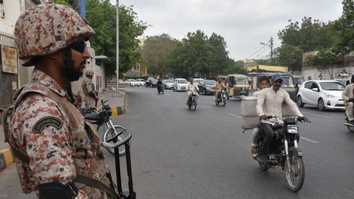ISLAMABAD -- The killing of al-Qaeda leader Ayman al-Zawahiri in a US strike in Afghanistan is not only a major blow to terrorism globally but is particularly crushing for the group in Pakistan and throughout the region, analysts say.
A drone strike killed al-Zawahiri at a "safe house" in Kabul, US President Joe Biden said last Monday (August 1).
A senior administration official said the 71-year-old Egyptian was on the balcony of a three-storey house in Sherpur, one of Kabul's most affluent neighbourhoods, when targeted with two Hellfire missiles after dawn Sunday.
Defence and intelligence officials studied the construction of the home, aiming to hit al-Zawahiri without threatening the building's structural integrity, to minimise the risk to civilians.
![A screenshot from footage broadcast by Al-Jazeera on January 6, 2006, shows Ayman al-Zawahiri giving a speech at an undisclosed location. [AFP]](/cnmi_pf/images/2022/08/08/36562-000_was209067__1_-585_329.jpg)
A screenshot from footage broadcast by Al-Jazeera on January 6, 2006, shows Ayman al-Zawahiri giving a speech at an undisclosed location. [AFP]
Apparent photographs of the building show only a few windows on one floor blown out, and the rest intact.
"Al-Zawahiri's family members were present in other parts of the safe house at the time of the strike and were purposely not targeted and were not harmed," the official said.
Al-Qaeda's global mastermind
Al-Zawahiri was believed to be the mastermind who steered al-Qaeda's operations -- including the September 11, 2001, attacks on the United States -- as well as Osama bin Laden's personal doctor.
He took over al-Qaeda after bin Laden was killed by US special forces in Pakistan in 2011, and played a key role in encouraging the decentralisation of the group and the creation of al-Qaeda franchises all over the globe.
In 2014, al-Zawahiri launched al-Qaeda in the Indian Subcontinent (AQIS) as the terrorist group's regional affiliate for South Asia and Afghanistan and appointed Asim Umar its regional head.
Umar, who was designated as a global terrorist by the United States in 2018, was himself killed during a raid in September 2019 on a compound in Musa Qala district, Helmand province, Afghanistan.
"AQIS is a major terror outfit that has been linked with various Pakistani militant groups, such as the Tehreek-e-Taliban Pakistan [TTP]," a Karachi-based counter-terrorism police official said on the condition of anonymity.
However, Pakistan's crackdown on militancy and terrorism has greatly degraded AQIS's presence in the country, the official said.
"Because the TTP and other Pakistani militant outfits maintained its al-Qaeda-inspired ideology, al-Zawahri's death can be seen as a major blow to the jihadi groups in Pakistan," he added.
Regional ambitions
Al-Zawahiri's decision to establish AQIS was a response to the creation of the "Islamic State in Iraq and Syria" Khorasan branch (ISIS-K), according to analysts.
"Al-Zawahiri himself appeared in a video introducing Asim Umar ... The two vowed to strike terror in the Indian subcontinent," Farhan Zahid, an Islamabad-based security analyst, told Pakistan Forward in 2019.
"The rationale was quite simple: al-Qaeda could not allow ISIS to gain ground on the variegated jihadi landscape of Pakistan that al-Qaeda has long dominated," he said.
In September 2014, AQIS attempted to hijack a Pakistani Navy frigate in Karachi, leaving 10 paramilitary personnel dead and 15 wounded. Two attackers were killed in the fighting, and a third self-detonated.
Following a crackdown on militants in Pakistan in 2017, al-Zawahiri tried to reorganise AQIS by devising a new strategy focused on smaller cells and the recruitment of educated youth from academic institutions.
Ansarul Shariah Pakistan (ASP), a little-known pro-AQIS militant group that surfaced in Karachi in 2017, was one sign of the new strategy.
ASP included about a dozen members said to be operating under the umbrella of al-Nusra Front, an al-Qaeda-linked group based in Syria.
AQIS has about 180 to 400 fighters, primarily from Bangladesh, India, Myanmar and Pakistan, according to a United Nations (UN) Security Council report released July 15.
With the death of al-Zawahiri, al-Qaeda now faces a succession quandary.
"Al-Zawahiri was not involved in the day-to-day decision-making of the affiliates," Hans-Jakob Schindler, director of the NGO Counter-Extremism Project and a former UN adviser, told AFP.
"But you need a figurehead with a certain prominence and seniority because all the heads of all the affiliates need to swear personal loyalty to him," he said.
"So replacing him is going to be a bit of a challenge."
Focus on Pakistan
Al-Zawahiri in his writings long used the implementation of Islamic law as an excuse for their insurrection and terrorist activities in Pakistan.
Al-Zawahiri's 130-page monograph titled "The Morning and the Lamp", which analysed Pakistan's constitution, marked the "most extraordinary escalation" of al-Qaeda's attempt in 2009-2010 to overthrow the Pakistani government, according to Michael W.S. Ryan, a senior fellow at the Jamestown Foundation.
The monograph, which was translated into Urdu, does not merely "call for radical reform of the Islamic Republic of Pakistan along the principles traditionally espoused by al-Qaeda and its local allies; it calls for the destruction of the state itself", Ryan wrote in 2010 in Terrorism Monitor, a publication from The Jamestown Foundation, a defence policy think tank based in Washington, DC.
"For al-Zawahiri, Pakistan was an important country strategically and it was the reason why he continually targeted the legitimacy of the Pakistani state through his statements," said Allama Shahid Farooqi, a Karachi-based religious leader and a signatory of the Paigham-e-Pakistan (PeP), or Message of Pakistan.
Thousands of Pakistani Islamic scholars in 2018 signed the PeP, a consensus-based counter-terrorism policy document mainly to counter assaults from extremist leaders, such as al-Zawahiri, on Pakistan's constitution.
"Al-Zawahiri misinterpreted Islamic teaching to support terrorism that has killed thousands," Farooqi said.

![Information on a leader of al-Qaeda in the Indian Subcontinent (AQIS) in Karachi is seen in the latest edition of the Counter-Terrorism Department's Red Book, a list of Pakistan's most wanted terror suspects. [Zarak Khan]](/cnmi_pf/images/2022/08/08/36558-photo_1-585_329.jpg)






